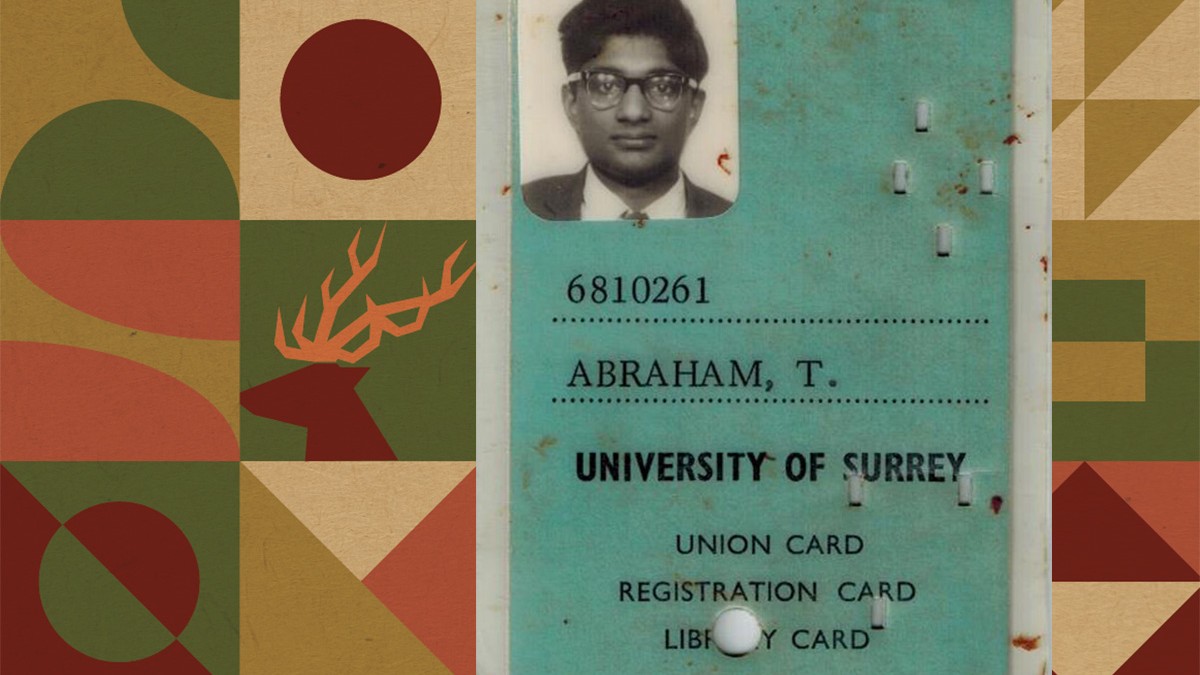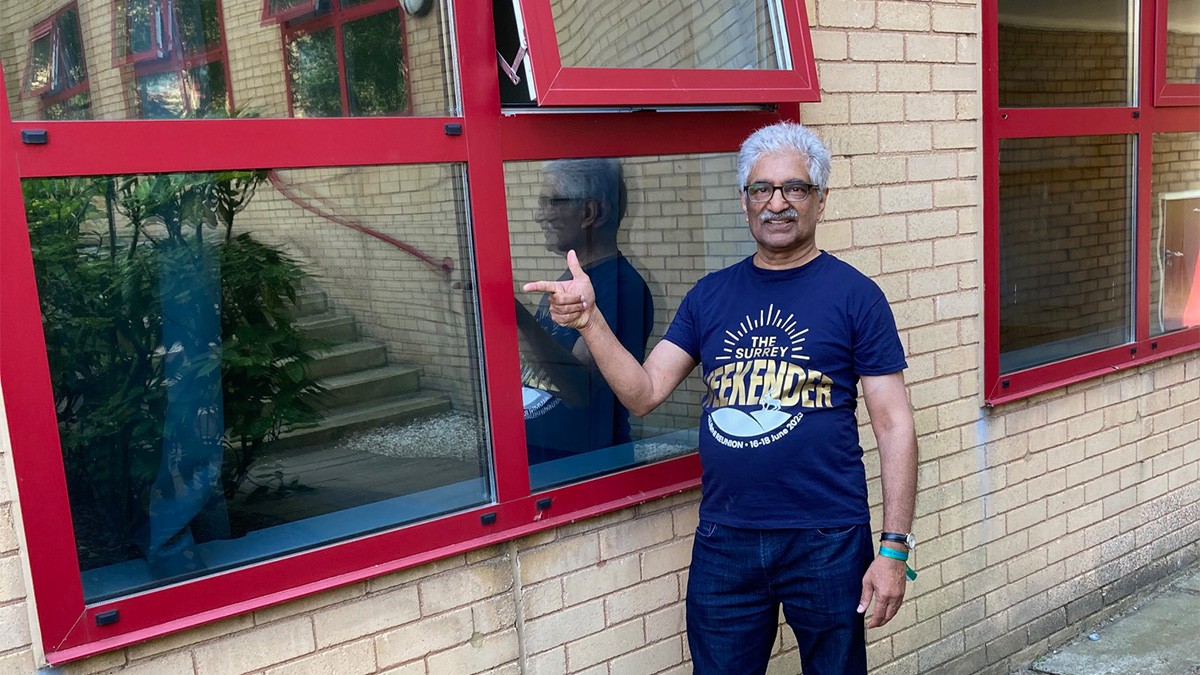“I fancied becoming a James Bond sort of figure…”
Tom Abraham came to Surrey via India and Ghana in 1968 to study a BSc in Electrical Engineering. One of our first student intake in Guildford, he recalls snowball fights, political debates and late-night renditions of calypso classics…
Why did you come to Surrey?
My father was a teacher from India working in Ghana and I was at school there. Peter Street, my physics teacher in the Sixth Form, was a Surrey graduate, although he'd started at Battersea College of Technology, which was the forerunner institution to the University of Surrey. He was returning to Surrey to do a PhD and he encouraged me to apply for a place there.
Why did you choose Electronic Engineering?
Part of what Peter taught in physics classes involved electronic devices and that was fascinating to me. Surrey had a good reputation in this area and in engineering because it was a core discipline at Battersea. It was a good fit for me.
Were you part of the first cohort to study at Surrey?
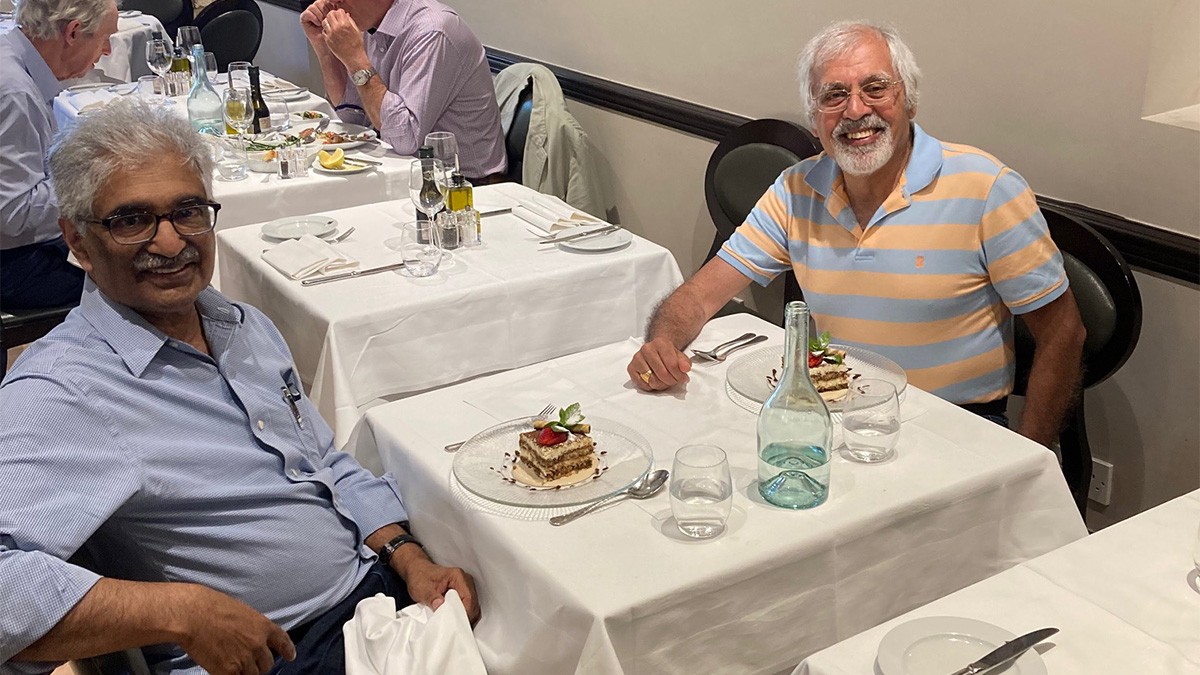
Earlier this year, Tom met up with fellow Surrey graduate Sol Isaac, who also started his degree in 1968
Yes. In 1968, the University officially opened its doors and we were the first group to start and complete our studies in Guildford.
I didn’t initially live on campus because there wasn’t enough accommodation. I had digs in a village called Pirbright, which is about six miles from Guildford. I used to commute in by bus. When you arrived at Stag Hill, the area around Senate House was a building site.
I remember the Vice-Chancellor, Peter Leggett, telling the cafeteria staff to provide extra large portions to the students to make up for the fact that lots of them had to commute in and navigate their way around this chaos.
What were your favourite parts of the course?
Computers and computer engineering were interesting modules. But physical electronics was the key focus for me. I was keenly interested in the practical side of learning how electronic devices functioned and how to make them. Professor Ken Stevens taught that part of the course and he was also my tutor. I was definitely more interested in the practical rather than the theoretical side.
Despite the chaos on the outside, the course facilities were good. They were new and the laboratories, the engineering department and the lecture theatres were ready to use when I arrived. The Students’ Union, its bar in Senate House and the cafeteria were also up and running.
Did you eventually live on campus?
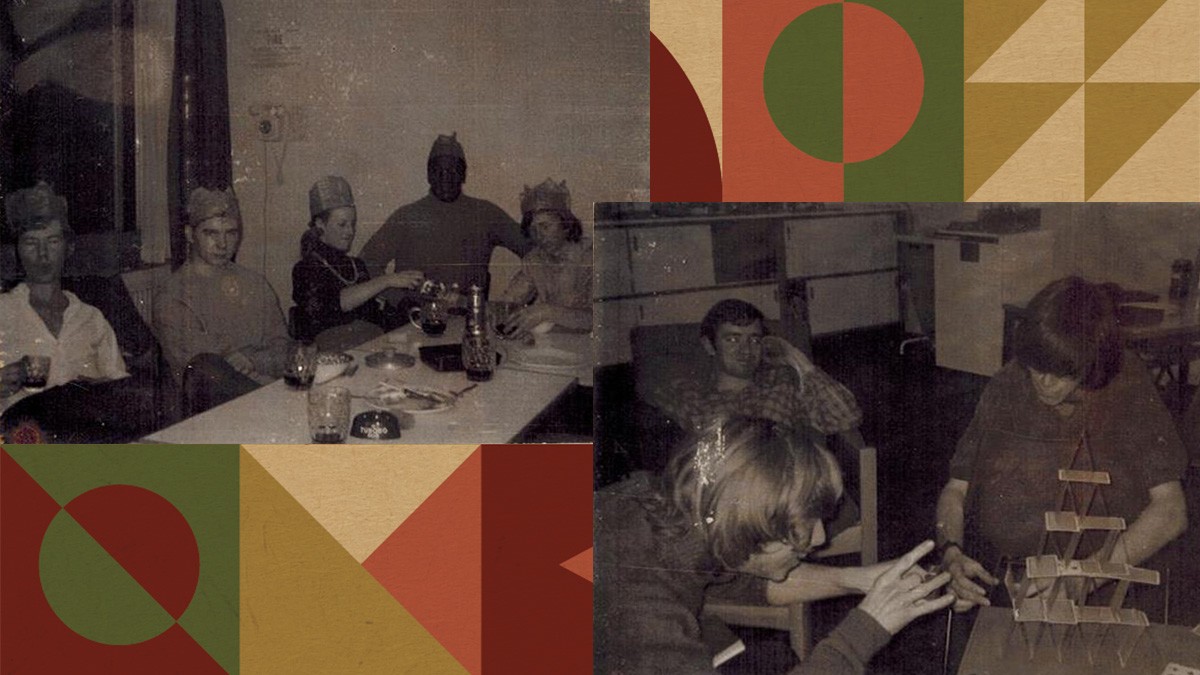
Tom's fellow Wandle 1 students enjoying a party in 1970
I secured student accommodation in my second and third years. In the first year, only Battersea Court existed. In the second year, Surrey Court was built and, in the third year, Third Court was completed.
I stayed in Wandle 1 in Surrey Court. That was interesting because I made friends who weren’t in my class or on my course. We were the first occupants of Surrey Court and each court had its own student council. I was elected as the Secretary/Treasurer of Surrey Court. I assisted the warden with running the complex, and I had to write up minutes and report any building issues.
The Chairman of the Surrey Court Council was a good friend of mine called Mike Gooch, who was a final year engineering student. We had a lot of fun and we’re still in touch after 50 years. He lives in the UK. I’ve visited him and his wife, Kate, who’s also a Surrey Graduate, several times. He’s also visited me both in Canada and Texas.
What was student life like?
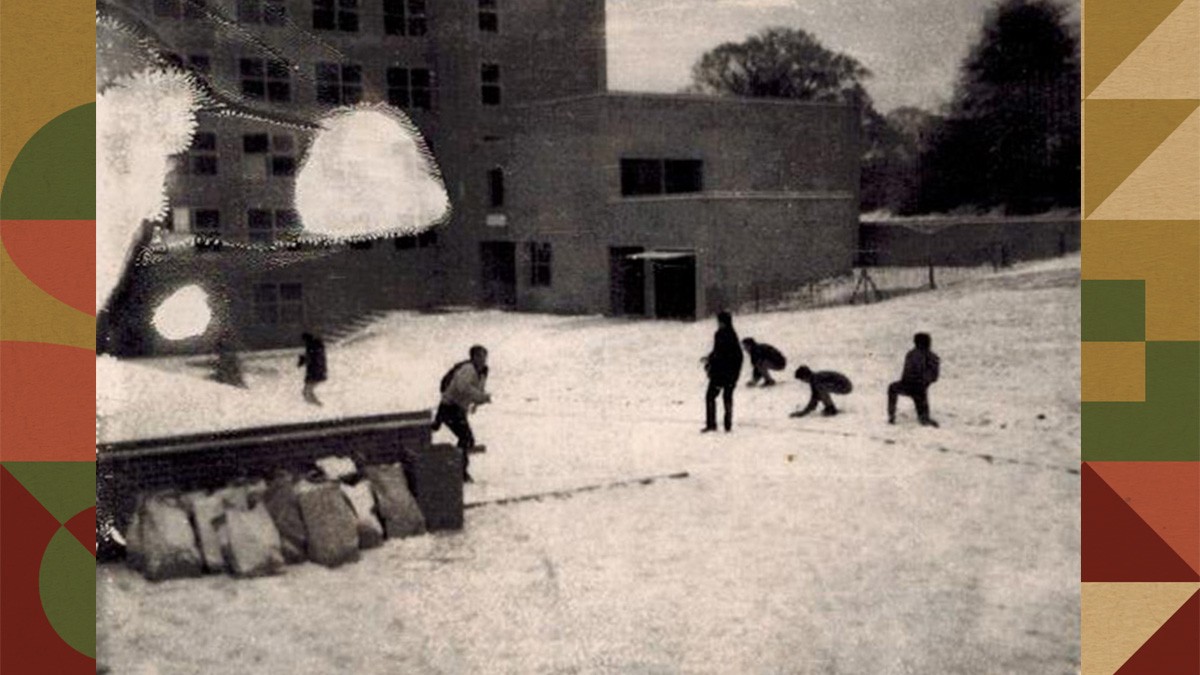
The student snowball fight in 1969
It was a lot of fun and I enjoyed it. I remember one November when it snowed heavily. We saw friends from another house playing around outside, so we challenged them to a snowball fight. Their house, Bourne 1, was opposite Wandle 1 and the warden’s house was in between. Mid-fight, the warden left his house to get into his car. He reversed out between the two sides and his car got pelted by snowballs. He wasn’t very happy and he stopped his car to start yelling at us. To his utter dismay, he saw his Chairman and his Secretary/Treasurer were among the ringleaders.
I also recall the University wanting to raise the rent by 50p. Myself and Mike called a meeting of all Surrey students and we recommended a rent strike. But we had no idea what we were doing, so we decided to confront the Vice-Chancellor about this. We arranged a meeting to tell him that we were going to stage a rent strike unless he cancelled his plans. He met with us and we explained our position with Mike laying out some vague arguments – and it worked.
The increase was cancelled. It was an unexpected victory at the time. If they’d have ignored us, we probably wouldn’t have known what to do. We were student activists but we had no plan of activism.
To be fair to the Vice-Chancellor, he was always understanding towards us. Even though there was a lot of rebellion on campuses elsewhere in the UK, he was easy going. It was one of the reasons there wasn’t a huge amount of disruption and antagonism between our university administration and the student body.
You also joined the West 1 Silly Things Society…
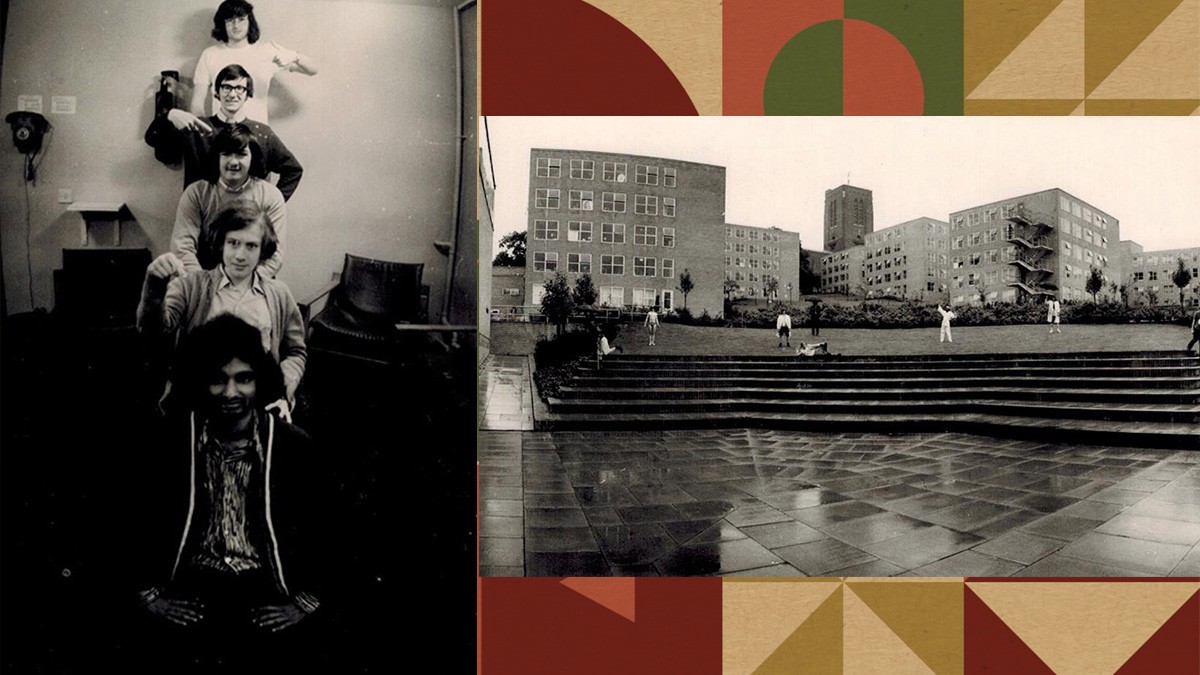
The West 1 Silly Things Society in their student digs and staging an event in the amphitheatre
In my final year, I lived in Battersea Court in West 1 with a group of first-year students. They were a bit maverick and they ended up forming a group called West 1 Silly Things Society. I joined in with some of their antics.
On one occasion, they marched around the campus wearing Viking helmets. They’d also congregate at 1am outside other halls of residence and sing The Banana Boat Song, which was made famous by Harry Belafonte. The University didn’t have so many buildings then. The sound would echo off the engineering block and come back to us. We thought it was great fun, but those trying to sleep nearby were less enthusiastic.
On another occasion, the West 1 Silly Things Society bought a pig’s head and placed it on the main University sign so that anyone arriving on campus would see it immediately. Security removed it pretty quickly.
What other clubs were you involved in?
I was a member of the Table Tennis Club and I captained one of the teams. I was involved in other clubs and societies, too.
One of these was British Universities North America Club – or BUNAC. It allowed students to get a visa to work in the USA over the summer. I worked in Atlantic City at the end of my first year. The rumour was that BUNAC was a recruiting ground for the CIA, but I was the secretary of our branch and I was never approached. That was a great shame. I fancied becoming a James Bond sort of figure.
Some 30 years later when I started work in the US, they pulled out my file and I was given the same social security number I had when I worked in Atlantic City.
I was heavily involved in the Students’ Union. One of my first speeches there involved defending the idea of student ID cards. The more left-wing members of the SU were vehemently against this. I defended it because I felt it had clear security benefits, and it meant we could immediately tell who should and shouldn’t be on campus. I did side with members of the Socialist Society on a lot of other issues, though. I also helped set up the Friends of Asia Society.
Did you attend any student gigs?
I saw quite a few. The Entertainments Secretary was a guy called Colin Bingham-Walker who lived on our floor in Wandle 1, and we’d often sneak into gigs or get in without paying the full price. It used to irritate him, but he was never confrontational about it. The Small Faces was one band that I particularly remember.
What was Guildford like in 1968?
It had good pubs and a few nice restaurants, but we didn’t venture into town much. Campus was a more appealing location. I did head out into the surrounding area, though, because I played in the local table tennis league.
What did you do when you graduated?
I left Surrey in 1972 and completed my PhD in Electronic Materials at Imperial College in 1976. My first full-time job was at ITT Semiconductors at Footscray, Kent, in 1977. In 1982, I moved to Canada to work at Northern Telecom. After 14 years there, I moved to the USA to work for Cypress Semiconductors in Texas. I was there for nine years until I joined one of their subsidiary operations, SunPower, working in solar energy generation, capture and storage. That was in 2011. I spent the last six years of my career working as the company’s Global Engineering Director.
One of my most memorable work experiences involved Steve Jobs yelling at my boss because we couldn’t deliver enough chips. This was around 2004-2005 and we’d developed a new technology called SONOS – which is a composite multi-layer film structure – and we used it to make Static Random Access Memories. We managed to incorporate this into a micro controller, and Apple wanted to use this device in their first iPods and iPhones. We made a Microcontroller using this technology for a specific application and the Apple engineers loved it. The price point made it attractive, too, so Apple put in a huge order.
Because it was a new technology, however, it had some teething issues we hadn’t resolved and we had problems meeting their order. Steve Jobs got on the phone to my boss and he used very “colourful” language. When my boss got off the phone, he came through to our department and he was similarly abrasive. By then, though, we’d managed to iron out most of the initial issues and we were soon back in production. We managed to make the volume that Apple wanted and never heard from them again, which was a good thing.
My entire 40-year career was in semiconductor processing. Currently retired, I spend most of my time helping to look after my grandchildren.
How did your time at Surrey influence your career?
It gave me a clear understanding that there was a time for fun and a time for work. That was important as the semiconductor industry is intense and you have to be very focused. I could be intense and focused. But I also knew how to have fun and relax away from it.
Finally, what advice would you give to the undergraduate version of yourself?
I’d say, “Make sure you take every opportunity to learn and don’t slack off on your studies.” I did very well in my first year, but I eased off in my second year. That made the third year a bit of a struggle. So work consistently hard.
But, obviously, don’t forget to have fun…
